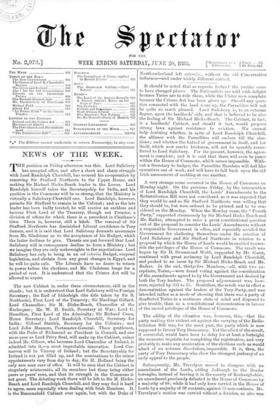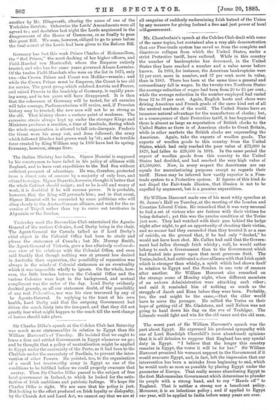NEWS OF THE WEEK.
THE position on Friday afternoon was this. Lord Salisbury has accepted office, and after a short and sharp struggle with Lord Randolph Churchill, has secured his co-operation by removing Sir Stafford Northcote to the Upper House, and making Sir Michael Hicks-Beach leader in the Lower. Lord Randolph himself takes the Secretaryship for India, and his position in the Commons will be so strong, that the Ministry is virtually a Salisbury-Churchill one. Lord Randolph, however, permits Sir Stafford to remain in the Cabinet ; and as the late leader has been badly treated, he will receive an earldom and become First Lord of the Treasury, though not Premier, a division of offices for which there is a precedent in Chatham's time. There is, however, still a hitch. The removal of Sir Stafford Northcote has diminished Liberal confidence in Tory finance, and it is said that Lord Salisbury demands assurances from Mr. Gladstone as to the acceptance of his Budget, which the latter declines to give. Threats are put forward that Lord Salisbury will in consequence decline to form a Ministry ; but we imagine they are only makeweights in the negotiations. Lord Salisbury has only to bring in an ad interim Budget, suspend legislation, and abstain from any great changes in Egypt, and he will be quite safe. The Liberals have no desire to return to power before the elections, and Mr. Gladstone longs for a period of rest. It is understood that the Crimes Act will be allowed to expire.
The new Cabinet is, under these circumstances, still in the clouds ; but it is understood that Lord Salisbury will be Foreign Secretary ; the Earl of Iddesleigh (the title taken by Sir S. Northcote), First Lord of the Treasury; Sir Hardinge Giffard, Lord Chancellor; Sir M. Hicks-Beach, Chancellor of the Exchequer ; Mr. W. H. Smith, Secretary at War ; Lord G. Hamilton, First Lord of the Admiralty; Sir Richard Cross, Home Secretary; Lord Randolph Churchill, Secretary for India ; Colonel Stanley, Secretary for the Colonies ; and Lord John Manners, Postmaster-General. These gentlemen, with the Duke of Richmond as President in Council, and one more peer as Lord Privy Seal, will make up the Cabinet, unless indeed Mr. Gibson, who becomes Lord Chancellor of Ireland, is admitted into it,—a most improbable innovation. Lord Carnarvon will be Viceroy of Ireland ; but the Secretaryship for Ireland is not yet filled up, and the nominations to the minor appointments vary from day to day, Sir H. Holland being the only new man sure of office. It will be seen that the Cabinet is singularly aristocratic, all its members but three being either peers or peers' sons, and that its strength in the Commons is not great. The debating work there will be left to Sir M. HicksBeach and Lord Randolph Churchill, and they may find it hard to agree, more especially when dealing with Irish Members. It is the Beaconsfield Cabinet over 'again, but with the Duke of
Northumberland left out—Le., without the old Conservative influence—and under widely different contiol.
It should be noted that as regards Irelaul the parties scent to have changed places. The Nationalists are wild with delight because Tories are to rule them, while the Ulster men complain because the Crimes Act has been given up. Should any question connected with the land come up, the Parnellites will not be quite so much pleased. Lord Salisbury is, to an extreme degree, upon the landlords' side, and that is believed to be also the feeling of Sir Michael Hicks-Beach. The Cabinet, in fact, is a landlords' Cabinet, and should it last, would propose strong laws against resistance to eviction. We cannot help doubting whether, in spite of Lord Randolph Churchill, the alliance with the Parnellites will endure till the elec. tions ; and whether the hatred of government in itself, and for itself, which now marks Irishmen, will not be speedily transferred to Lord Salisbury. For the present, however, the agreement is complete ; and it is said that there will even be peace within the House of Commons, which seems impossible. Without a Secretary to badger, the Parnellite Members will feel like operatives out of work, and will have to fall back upon the old Irish amusement of scolding at one another.
A very strange scene occurred in the House of Commons on Monday night. On the previous Friday, by the intervention of Lord Randolph Churchill, the Lords' Amendments to the Redistribution Bill were not considered, as it was expected that they would be and as Sir Stafford Northcote was willing that they should be, but were ordered to be printed and to be considered on the Monday. When the Monday came, the "Fourth Party," supported strenuously by Sir Michael Hicks-Beach and. Mr. Raikes, attempted to raise a great constitutional question out of the proposal to consider the Lords' Amendments without a responsible Government in office, and especially assailed the Government for sheltering themselves under the sanction of Lord Salisbury and Sir Stafford Northcote in relation to a proposal by which the House of Lords would be enabled to override the privileges of the House of Commons. The revolt was begun by Sir H. Drummond Wolff, supported by Mr. Gorst, continued with great acrimony by Lord Randolph Churchill, and pushed to an issue by Sir Michael Hicks-Beach and Mr. Raikes. In the end, thirty-five Members,—all, with two exceptions, Tories,—were found voting against the consideration of the amendments agreed to by the Government and desired by both the Tory leaders. The proposed adjournment was, however, rejected by 333 to 35. Doubtless, the revolt was in effect a demonstration against the leaders of the Tory Party, and was intended rather as a mode of showing that there was a party of disaffected Tories in a mutinous state of mind and disposed to give trouble, than as a constitutional demonstration in favour of the sacred privileges of the House of Commons.
The oddity of the situation was, however, this,—that the party making this violent set against the carrying of the Redistribution Bill was, for the most part, the party which is now supposed to favour Tory Democracy. Yet the effect of the revolt, if successful, would have been to delay for at least a fortnight the measures requisite for completing the registration, and very probably to make any acceleration of the elections such as would admit of an autumn dissolution, impossible. It is, then, the party of Tory Democracy who show the strongest jealousy of an early appeal to the people.
Subsequently, Mr. Trevelyan moved to disagree with an amendment of the Lords, adding Jedburgh to the Border boroughs, instead of leaving it in the county of Roxburghshire, an amendment previously defeated in the House of Commons by a majority of 88; while it had only been carried in the House of Lords by a majority of 68 contents, against 53 non-contents. Mr. Trevelyan's motion was carried without a division, as also was another by Mr. Illingwortb, altering the name of one of the Yorkshire districts. Otherwise the Lords' Amendments were all agreed to ; and doubtless last night the Lords acquiesced in the disagreement of the House of Commons, so as finally to peas this great Bill. We were, however, obliged to go to press before the final assent of the Lords had been given to the Reform Bill.
Germany has lost this week Prince Charles of Hohenzollern, the "Red Prince," the most dashing of her higher officers, and Field-Marshal von Ma.nteuffel, whom the Emperor entirely trusted, and who has for some years governed Alsace-Lorraine. Of the twelve Field-Marshals who were on the list in 1873, only two—the Crown Prince and Count von Moltke—remain ; and while the Crown Prince must be Emperor, the Count is too old for service. The great group which subdued Austria and France, and raised Prussia to the headship of Germany, is rapidly passing away, and in ten years will have disappeared. It is then that the coherence of Germany will be tested, for all enemies will take courage, Parliamentarism will revive, and, if Prussian history may be trusted, the new men will not be as strong as the old. That history shows a curious point of weakness. The excessive strain always kept up under the stronger Kings and Ministers produces a reaction, a time of lassitude, during which the whole organisation is allowed to fall into disrepair. Frederic the Great wore his army out, and Jena followed; the army which followed Blucher had grown weak by '48; and the terrible force created by King William may in 1900 have lost its spring. Germany, however, always lives.
The Italian Ministry has fallen. Signor Mancini is supposed by his countrymen to have failed in his policy of alliance with England, and to have sent expeditions to the Red Sea without sufficient prospect of advantage. He was, therefore, protected from a direct vote of censure by a majority of only four, and offered to resign. Signor Depretis, however, thought it better that the whole Cabinet should resign ; and as he is old and weary of work, it is doubtful if he will resume power. It is probable, however, that the King will persuade him ; and in that event, Signor Mancini will be succeeded by some politician who will cling closely to the Austro-German alliance, and wait for the reversion of Tripoli rather than try to carve out territories in Abyssinia or the Soudan.
Yesterday week the Devonshire Club entertained the AgentsGeneral of the various Colonies, Lord Derby being in the chair. The Agent-General for Canada talked as if Lord Derby's chief object in the Colonial Office had been to study and please the statesmen of Canada ; but Mr. Murray Smith, the Agent-General of Victoria, gave a less effusively couleunderose view of his relations with the Colonial Office, and even said frankly that though nothing was at present less desired in Australia than separation, the possibility of separation was always in the minds of Colonial statesmen as an eventuality which it was impossible wholly to ignore. On the whole, however, the little brushes between the Colonial Office and the various Colonies were kept in the background, and mutual compliment was the order of the day. Lord Derby evidently doubted gravely, as all our statesmen doubt, of the possibility of any real Federation, nor was his view traversed by any of he Agents-General. In replying to the toast of his own health, Lord Derby said that the outgoing Government had driven the coach fairly into the inn-yard, and that they did not greatly fear what might happen to the coach till the next change of horses should take place.
Sir Charles Dilke's speech at the Cobden Club last Saturday was much more statesmanlike in relation to Egypt than Sir William Harcourt's of Tuesday. He insisted that we ought to leave a firm and settled Government in Egypt whenever we go ; and he thought that a policy of neutralisation might be applied to Egypt under the suzerainty of the Porte, as it had been to the Chablais under the suzerainty of Sardinia, to prevent the intervention of other Powers. He pointed, too, to the organisation of a small but trustworthy army in Egypt as one of the conditions to be fulfilled before we could properly evacuate that ountry. Then Sir Charles Dilke passed to the subject of free local government in Ireland, to which he looked for the satisfaction of Irish ambitions and patriotic feelings. We hope Sir Charles Dilke is right. We are sure that his policy is just. But looking to the effect produced on Irish loyalty or disloyalty, by the Church Act and Land Act, we cannot say that we are at all sanguine of suddenly undermining Irish hatred of the Union by any measure for giving Ireland a free and just power of local self-government.



































 Previous page
Previous page